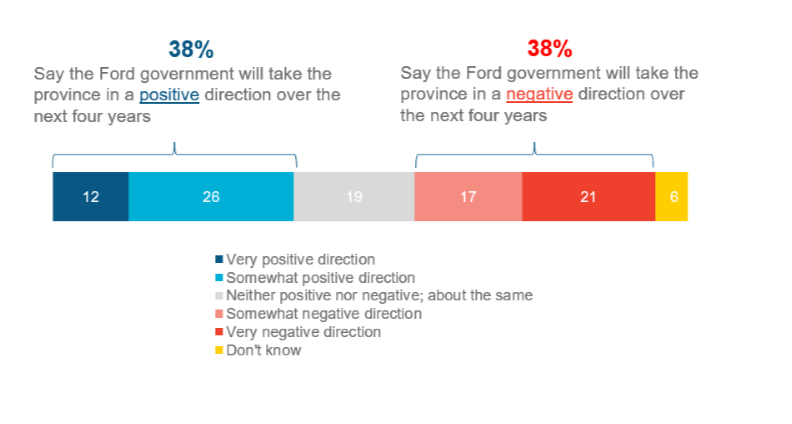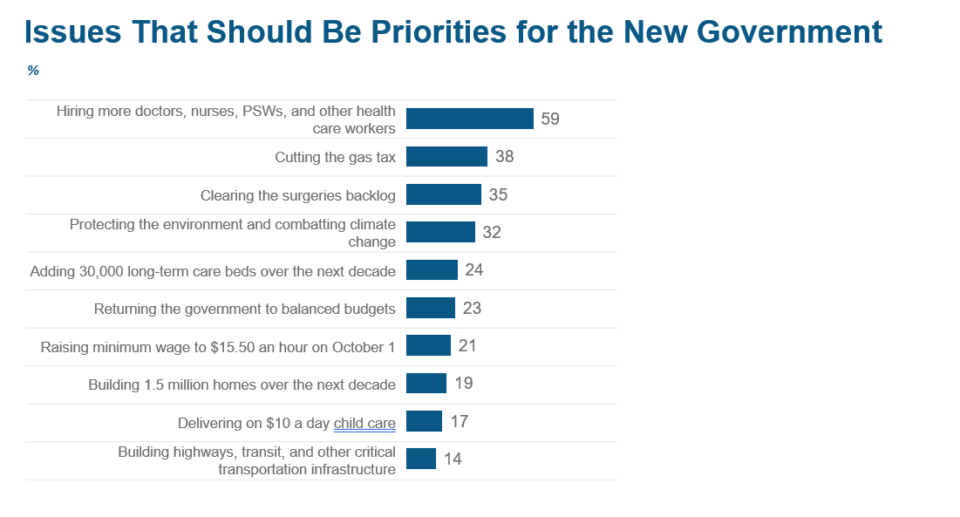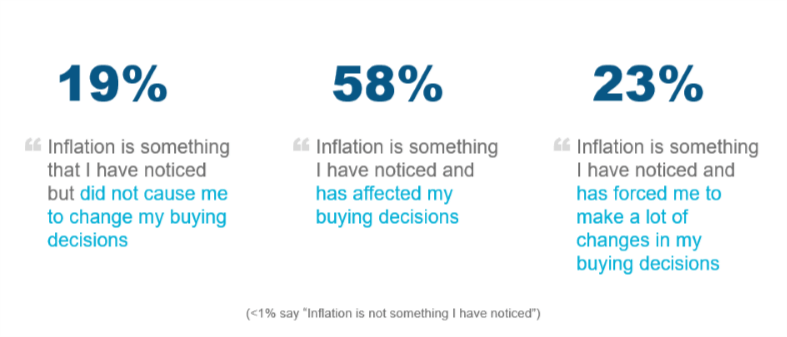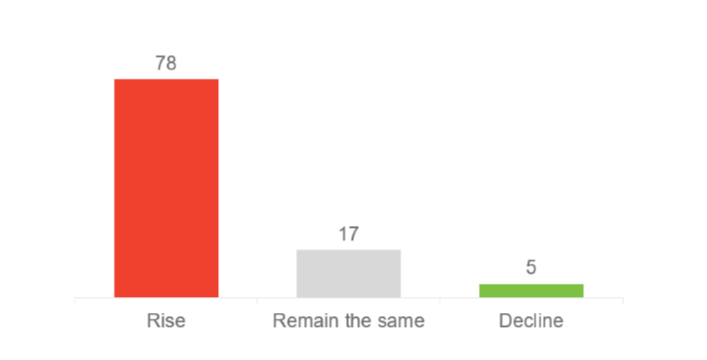Having secured a second majority, Premier Doug Ford must now turn his attention during the summer to a fresh agenda for his government over the next four years.
As we noted previously, despite the PCs’ big electoral success, this was an election in which the opposition parties failed to make the case for change and articulate a clear ballot box question. Coupled with low voter turnout, such ingredients are a recipe for success for the incumbent.
Stay Positive
After the election, Navigator fielded some post-election polling questions to get a sense of what Ontario voters are expecting of their new government.
When asked about whether they are optimistic or pessimistic about the future under a Ford government, Ontarians are surprisingly evenly split on whether a second mandate will be better or worse for them and their families. The low voter turnout means it will be a short honeymoon for Premier Ford’s second term.

To prove his critics wrong, the Ford government must now develop a positive, forward-looking agenda for addressing the campaign’s main issue of affordability as well as driving a strong economic recovery and overall growth post-pandemic. Delivering on the PCs’ promise to cut the gas tax is still high on the list for many Ontarians given recent price hikes at the pump.

Top of mind for Ontario voters is the need for the Ford government to hire more health care workers and clear the surgeries backlog in the wake of the pandemic. There is a perception that they have not taken as much action on these fronts as others where the PCs have clearly communicated progress (e.g. building transit and highways, signing a child care deal with the federal government).
Affordability and Inflation
With inflation reaching a 30-year high of 6.8 per cent in April, affordability is king on the political scene. In our research, we found more than 81 per cent of Canadians are saying that inflation has affected their buying decisions and most expect the problem to only get worse.
Has Inflation Affected Buying Decisions?


Expectations of Inflation
Despite this being a top campaign issue, Ontarians have very low confidence in the government’s ability to do anything about the problem. Just 16 per cent of voters said they were confident that the PCs could effectively deal with the problem.

With inflation expected to continue and the World Bank using the dreaded “r” word, the Ford government will have its work cut out in finding ways to bring more relief to people’s pocketbooks and shield families from the impacts of any potential downturn while trying to advance its fiscal responsibility agenda.
Profiling the New Legislature
New Members, Possible New Cabinet Ministers?
When the Ontario legislature returns, there will be several new faces in the PC caucus. The PCs have expanded its majority by eight seats as of June 2; however, veteran cabinet ministers Christine Elliott and Rod Philipps having opted not to run for re-election. Ford must now consider which of the existing cabinet ministers should be moved into new portfolios and whether any of the new MPPs with notable resumes should be elevated to cabinet to help balance regional diversity.
Here are our picks for who to watch among the new faces at Queen’s Park:
- Timmins Mayor George Pirie flipped the riding for the PC Party, earning a whopping 65 per cent of the vote and defeating sitting NDP MPP Gilles Bisson. As a former mining executive and mayor of a big town in Ontario’s north, Pirie is also a candidate Ford personally recruited over a multi-year period.
- City Councillor Chamaine Williams won the riding of Brampton Centre, defeating NDP deputy leader Sara Singh. In 2018, Williams became the first Black woman to be elected to Brampton’s city council and would bring needed diversity to the PC cabinet.
- Todd McCarthy, a corporate litigator and Deputy Judge, was elected in Durham – maintaining the all-important 905 riding for the PC party. Since his nomination, he has been viewed as a star candidate and an important individual to keep an eye on.
- Anthony Leardi, a former lawyer and Deputy Mayor of Amherstburg, clinched a PC win from the NDP incumbent in a region Ford has long had his eye on and will be looking to consolidate gains. Leardi served for 13 years as a federal agent for the Public Prosecution Service of Canada and acts as a guest lecturer for the Ontario Law Society.
A Quiet Opposition
In an unprecedented move, both NDP Leader Andrea Horwath and Liberal Leader Steven Del Duca resigned on election night. Since then, the opposition parties have been quiet – making no real attempts to attract media attention or advocate for specific policy priorities. Over the coming weeks and months, expect various candidates and potential candidates to come forward as they contemplate leadership bids.
The NDP and Liberals will also turn their attention to appointing interim leaders, listening to defeated candidates and Ontarians to better understand the outcome of this past election, and ultimately make a call on when to choose to leader. There are also rumblings of a potential merger of the NDP and Liberals to improve their electoral chances, but the idea seems unlikely giving the historical rivalries between the two parties.
Once an interim leader is chosen, the NDP will look to appoint critics to shadow Ford’s new cabinet. Lacking official party status, the Liberals are expected to once again play a minor role in the legislature as they conduct deep soul-searching on the June 2 results.
A Legislature that Looks Like Ontario?
In a step backwards, the returning legislature is actually less diverse than the set of MPPs voters sent to Queen’s Park in 2018. Despite three of the major parties nominating more than 50 per cent women, gender diversity is actually down slightly among elected MPPs. Just 47 of the 124 seats in this legislature will be represented by women, down slightly from 2018 when women filled 49 seats.
With respect to racial diversity, Ontarians who are Black, Indigenous or persons of colour account for just 22.5 per cent of seats. While this lags behind the 29.3 per cent of Ontarians who self-identify as being from a visible minority, it is a significant improvement from governments elected as recently as a decade ago.
Setting the Table
In the notorious words of Former Prime Minister Kim Campbell during the 1993 election, the last few weeks have shown that “an election is no time to discuss serious issues.” The 2022 election was sleepy and lacked meaningful engagement on issues. Now that the election is over, Ontario’s new government will have to face the music on a few critical files requiring heavy lifts.
Clearing the Surgeries Backlog
The immense stress that the pandemic put on the health care system has delayed non-essential health services and created a seemingly insurmountable backlog. As of two weeks ago, the Ontario Medical Association reported that there is currently a backlog of 22 million health services, including one million surgeries.
In his previous mandate, Premier Ford got the ball rolling on dealing with the backlog and called on the federal government to increase its share of health care funding. At one point, the PC government looked at the backlog of surgeries where there was the most urgent need and issued a call for independent health facilities (IHFs) to step up to address the problem, starting with cataract surgeries. We can expect the government to take a further look at what other surgeries would benefit from such calls.
Build, Build, Build
While the Liberals and NDP tried to wedge the PCs on this issue, our research showed 45 per cent of Ontarians supported the contentious Highway 413, with an even higher rate of support in the 905 (57 per cent). Ford and the PCs argued that this highway was necessary to save commuters time. This promise bore fruits on election night when the PCs swept the 905, including three pickups from the NDP in Brampton. Now that the election is behind us, the Ford government will undoubtedly want to “get it done” and start building the highway, along with other important projects, such as its GTA Subway Plan and Highway 417 expansion. The Ford government will also further continue its work to expand broadband, committing $4 billion over the next six years.
Teachers’ Collective Bargaining Agreements
With all the talk this past year was about whether students would be attending classes in-person or virtually, many forgot that there is a chance that there might not be classes at all for some students this fall. The collective agreements with all four of the major teacher unions in Ontario expire on August 31. That gives this government a relatively short runway to ensure that Ontario does not see any class cancellations like it did in late 2019 and early 2020. The government will want to avoid strikes or “work-to-rule” actions, where teachers only perform the tasks that are described in their official work responsibilities. This means that they would no longer perform non-essential work like report card comments, after school academic support or extracurricular activities. At a time when many parents feel that their children are behind because of the difficulties of learning during COVID, anything short of a deal being struck before the end of August would be a serious risk to the government.
Beer Store Contract Renewal
The Master Framework Agreement (MFA), a contract by the provincial government given to the Beer Store in 2015, expires in 2025. The Beer Store is owned by three brewers, Molson Coors (50.9%), Labbatt (44.9%) and Sleeman (4.2%). When the PCs took office in 2018, this agreement was initially threatened by Premier Ford’s commitment to liberalize beer and wine sales, including allowing the sale of these products in corner stores. After tense negotiations, the government passed but did not bring into force the Bringing Choice and Fairness to the People Act in 2019 and threatened to rip up the agreement.
Although there are still a couple of years until the agreement lapses, negotiations of this magnitude take months, if not years, to negotiate, so this is likely to become a pertinent issue to be addressed sooner than later. We can expect the Ford government will continue to liberalize alcohol sales wherever possible over the next few years.
Navigator is also available to ensure your business is well-positioned and engaging with the government and new cabinet. If you have questions, please reach out at info@navltd.com.





